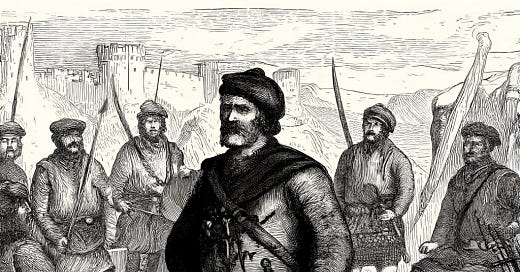Robert Fleming: Mastermind of Guerrilla Warfare in Medieval Scotland
The history of Scotland's struggle for independence is a tale of courage, strategy, and unwavering resolve. At the heart of this narrative is Robert Bruce, a king whose tactical brilliance and indomitable spirit led Scotland to victory against English domination. Yet, Bruce's success was not achieved in isolation. It was the product of a concerted effort by a group of loyal and strategic generals, among whom Robert Fleming played a pivotal role. Fleming's expertise in guerrilla warfare tactics was instrumental in turning the tide of war in favor of the Scots, ensuring their eventual triumph.
The Early Struggles of Robert Bruce
Robert Bruce ascended to the Scottish throne in 1306, a time of great turmoil. The death of King Alexander III and his heir had plunged Scotland into a succession crisis, leaving the nation vulnerable to English ambitions. Edward I of England sought to exert his influence over Scotland, leading to widespread conflict and resistance.
Bruce's early years as king were marked by significant challenges. He faced initial defeats and was forced into hiding. However, his resilience and strategic mind saw him adopting unconventional tactics to fight the larger and better-equipped English forces. This is where the role of his generals, particularly Robert Fleming, became crucial.
Robert Fleming: A Strategic Mastermind
Robert Fleming was among the trusted generals who stood by Robert Bruce during these tumultuous times. His deep understanding of the Scottish terrain and his ability to conduct guerrilla warfare were vital assets in the war against England. Guerrilla tactics, characterized by small, mobile units that use hit-and-run strategies, were perfect for the rugged and familiar landscapes of Scotland.
Fleming’s knowledge of the local geography allowed him to orchestrate surprise attacks on English forces, disrupting their supply lines and communication. These tactics not only inflicted significant damage on the English but also boosted the morale of Scottish troops, who saw that victory was possible even against a formidable enemy.
Key Battles and Strategic Victories
One of the most significant contributions of Robert Fleming was his involvement in key battles where guerrilla tactics played a decisive role. His ability to lead men through the dense forests and rugged highlands of Scotland meant that English forces often found themselves ambushed and outmaneuvered.
Fleming’s efforts were particularly crucial during the buildup to the Battle of Bannockburn in 1314. The guerrilla warfare tactics employed by Bruce's generals weakened English forces and disrupted their preparations, setting the stage for the decisive Scottish victory. Bannockburn was a turning point in the war, demonstrating the effectiveness of guerrilla tactics in achieving strategic goals.
The Legacy of Robert Fleming
Robert Fleming's contributions to the Scottish war of independence extend beyond his military exploits. After the victory at Bannockburn, Bruce rewarded his loyal generals with lands and titles, ensuring their continued support and solidifying his rule. Fleming was granted estates in western Scotland and was vested with the title of “Earl of Wigton.”
These rewards were not merely tokens of gratitude but strategic moves to ensure stability and loyalty among the Scottish nobility. Fleming's legacy is thus intertwined with the broader narrative of Scotland's fight for independence, highlighting the importance of strategic leadership and loyalty.
Conclusion
Robert Fleming's role in the Scottish war of independence underscores the critical importance of guerrilla warfare tactics in achieving military success against a more powerful enemy. His strategic brilliance and unwavering loyalty to Robert Bruce were key factors in the eventual Scottish victory over English forces.
Fleming's legacy is a testament to the power of unconventional tactics and the importance of deep local knowledge in warfare. His contributions helped shape the course of Scottish history, ensuring that Scotland remained a free and independent nation. The story of Robert Fleming serves as an enduring reminder of the impact that dedicated and strategic leadership can have on the course of history.





